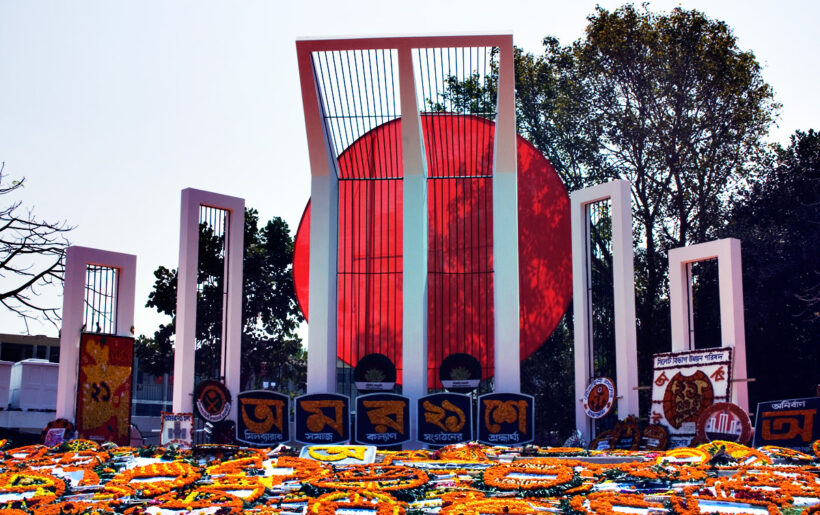The International Mother Language Day (IMLD) on 21st February is observed worldwide to promote cultural diversity, linguistics, and multilingualism, In Bangladesh, the day is observed as National Language Martyrs Day.
UNESCO announced the IMLD on 17 November 1999. It was officially recognized in 2008 under the United Nations General Assembly’s resolution.
Unfortunately, due to globalization just over 40% of the 6,000 or so languages spoken today are endangered and only a few hundred languages have a place in educational systems.
Every two weeks a language disappears — taking with it an entire cultural and intellectual heritage.
Two Bangladesh-born activists Rafiqul Islam and Abdus Salam live in Vancouver, Canada wrote a letter to Kofi Annan, then Secretary General of the United Nations on 9 January 1998 urging him to take steps to save the world’s languages from extinction by declaring an International Mother Language Day. The duo proposed the date as 21 February to commemorate the language martyrs of 1952 in Dhaka.
Pakistan Legislative Assembly in 1948 in the capital city Karachi (later the capital moved to Islamabad) adopted Urdu as the official language with an overwhelming voice vote.
The people of East Bengal (now Bangladesh) demanded that Bangla, the language spoken in Bangladesh should also be recognised as an official language.
It was very odd, that Urdu was never the mother tongue of Pakistan. The four provinces of Pakistan – Punjab, Sindh, Balochistan, North West Frontier Province (renamed Khyber Pakhtunkhwa) and East Bengal (now Bangladesh) had separate mother languages for centuries.
Urdu was spoken only by political elites of the Pakistan Muslim League and elites of Pakistan. Mohammad Ali Jinnah, the founder of Pakistan negotiated a separate nation for Muslims of India from the British Raj, and other political elites spoke Urdu.
In 1948, a year after the birth of Pakistan, Urdu was declared to be the nascent state’s national language.
The elected members from East Bengal of the Pakistan constituent assembly vehemently protested in the house. But the voice was too feeble to make them heard in the assembly.
Promptly, the political leaders, youths, and students in Bangladesh protested loudly. The news of the stubborn Pakistan politician’s refusal to accept another state language picked up momentum among all strata of the society. The country plunged into country-wide unrest.
On 21 February 1952, the angry student decided to march towards the East Bengal Legislative Assembly in Dhaka in demand Bangla should also be an official national language.
Hundreds of students marched with banners and placards en route to the provincial assembly hall – located on the Dhaka University campus was barricaded by armed police.
The civil administration imposed a ban on rallies and street protests. The students attempted to march through the barricade – police fired live bullets at the demonstrators. Five protesters were shot and killed and hundreds more were wounded.
The news of police firing sparked wildfires all over the country. Hundreds of students and political leaders were arrested for protesting the police firing and demanding recognition of Bangla as a national language of Pakistan.
Finally, Bangla was recognised as one of the state languages of Pakistan at a session of newly elected members of the United Front to the National Assembly on 9 May 1954.
The Bangla language created a nation-state – from East Bengal to East Pakistan and now to present Bangladesh.
After 1952, the people of Bangladesh were frustrated with the attitude of the elite politicians of Pakistan who deliberately adopted a policy to alienate people living in the eastern province of Pakistan.
The citizens of Pakistan looked down on the people of the eastern region as a low-caste Bangalee (Bangla-speaking population). Visible marginalisation in higher education, jobs in civil administration, and recruitment in Pakistan’s armed forces. The people in Bangladesh felt they were deliberately discriminated against.
Moreover, the administration of the eastern province was dominated by people in civil administration, judiciary, police, and military who were transferred from Pakistan, and they spoke Urdu, a language alien to the local people.
The simmering dissent in East Bengal, treated as a colony of Pakistan and governed by political and military elites from the capital Islamabad for 2.5 decades erupted in a mass protest in 1969.
The IMLD has also made an impact in Bangladesh. The 50 different Adivasis (national ethnic communities) could now study their languages in schools in remote hill forests.
To conclude the United Nations on IMLD says: Languages are the most powerful instruments of preserving and developing our tangible and intangible heritage. When one language vanishes, a part of the world’s rich tapestry of cultural diversity also disappears.
Saleem Samad, is Deputy Editor of The Daily Messenger, an award-winning independent journalist, and recipient of Ashoka Fellowship and Hellman-Hammett Award.He could be reached at <saleemsamad@hotmail.com>; Twitter (X) @saleemsamad






